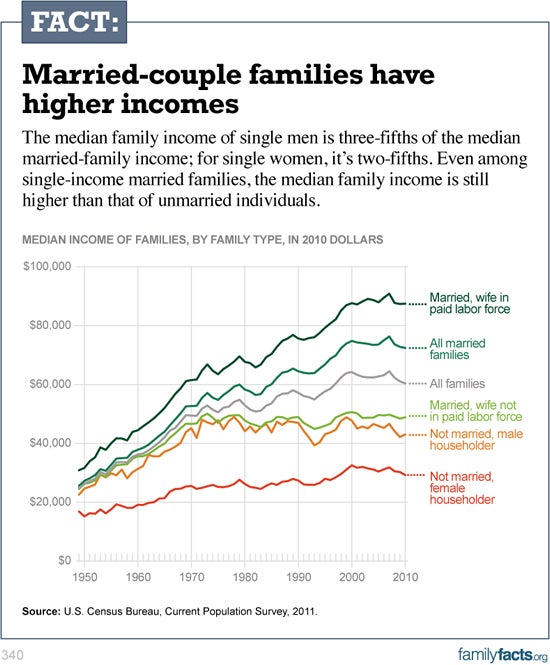The benefits of marriage are numerous: from increasing financial health to promoting child well-being, tying the knot can have a profound impact on individuals’ futures. According to a new survey, Americans overwhelmingly recognize the value of marriage to advancing society. (Article continued below chart)
A new Rasmussen poll released this week shows that more than three in four Americans consider marriage an important societal institution. According to the survey, 78 percent of American adults say matrimony is at least “somewhat important” to society, including 60 percent who rate marriage as “very important.”
The poll’s results are not surprising, given the tremendous benefits of marriage to couples and children. As research on Heritage’s FamilyFacts.org demonstrates, marriage can positively affect child development, social decisions, and academic performance. Children and teens living in married-parent households tend to have greater educational achievement and are less likely to exhibit behavioral problems. Adolescents living in an intact, married home are also less likely to abuse drugs and are at a decreased risk for experiencing a teen pregnancy.
Marriage is also associated with better financial prospects. Married-couple families tend to have higher household incomes than their unmarried counterparts, even when only one spouse is in the paid labor force. Married couples also tend to have greater wealth accumulation and are more likely to own their own homes.
In addition to the institution’s many social and economic benefits, marriage has even been shown to increase physical and psychological health. Married men and women tend to smoke less, are less likely to report problems with alcohol, and have lower levels of depression than their single peers.
Despite the many benefits of marriage and the overwhelming acknowledgement by Americans that the institution is important to society, an increasing number of men and women are forgoing matrimony. Marriage in the United States has been on the decline for many decades, with the annual marriage rate now half of what it was four decades ago. Today, just 51 percent of American adults are currently married.
Unfortunately, the decline of marriage in America could signal serious trouble for the next generation and for the health of civil society. With more than four in 10 children now born outside of marriage, millions of children are unable to experience the relative financial and social stability of married households and are at an increased risk of poverty and government dependence.
The stakes are too high to ignore the value of marriage to the nation’s future. Policymakers and national leaders should affirm Americans’ instincts that marriage plays an important role in society by eliminating disincentives to marry and promoting the institution’s many benefits.



























